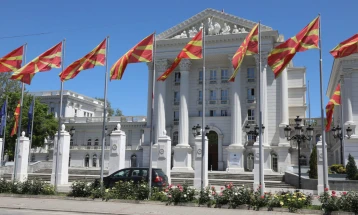Improved education and integration essential for economic empowerment of Roma women: conference
- Improved education and integration are essential for the economic empowerment of Roma women, concluded speakers at an event Monday on economic empowerment of Roma women organized by the Institute for Policy Research and Analysis – Romalitico in cooperation with the Ministry of Social Policy, Demographics and Youth as part of the project “Beyond Barriers: Resilience of Roma in the Western Balkans”.

Skopje, 14 April 2025 (MIA) - Improved education and integration are essential for the economic empowerment of Roma women, concluded speakers at an event Monday on economic empowerment of Roma women organized by the Institute for Policy Research and Analysis – Romalitico in cooperation with the Ministry of Social Policy, Demographics and Youth as part of the project “Beyond Barriers: Resilience of Roma in the Western Balkans”.
Ahead of the event, Deputy Minister of Economy and Labor Marjan Risteski told journalists the event is very significant for solutions to issues faced by the Roma community, above all employment and greater emancipation and representation of Roma women within the system.
“My message would be as much education as possible for the Roma population, the Government will work towards this. But also greater competitiveness on the labor market. Not only as workforce, but also as representatives of many important posts in the country,” Risteski stressed.
Gjoko Velkovski, Deputy Minister of Social Policy, Demographics and Youth, underlined the importance of integrating Roma women within society.
“As the Ministry of Social Policy, Demographics and Youth, we continue to provide maximum support, by taking all necessary activities within our competency,” Velkovski said, adding that they would subsidize activities for the employment of Roma women.
Deputy Minister of European Affairs, Viktorija Trajkov, said economic empowerment of Roma women is a goal for the Government on the path to European integration.
“With assistance from the Growth Plan, we can create a society that will be economically empowered and socially just,” Trajkov said, adding that the Government is ready to work on improving the rights of all communities.
Regarding the rights of Roma women, Trajkov said the issue would be “horizontally established” within the frameworks of the country’s strategic documents. The idea, she said, is to put a special emphasis on the inclusion of Roma women in economic processes.
“According to the European Commission’s 2024 Progress Report for Macedonia, Macedonia made satisfactory progress in relation to the integration of Roma, but it [the report] also notes that challenges remain in terms of inclusion within regular education, children on the streets and segregation in schools,” Trajkov said.
Gjulten Mustafova, the project manager of “Beyond Barriers: Resilience of Roma in the Western Balkans”, a three-year project funded by the European Union, said the project is being implemented in five countries – North Macedonia, Serbia, Albania, Kosovo, and Bosnia and Herzegovina. Thirty organizations from these countries will work jointly on a regional level to improve the situation of Roma people, boost employment and lower discrimination. Memoranda of cooperation have already been signed within the country with the Business Confederation of North Macedonia and the Organization of Employers of Macedonia, she said.
Photo: MIA











